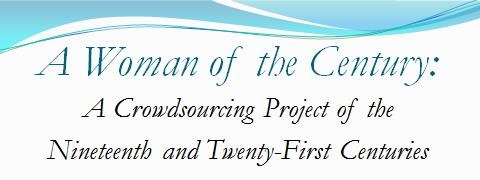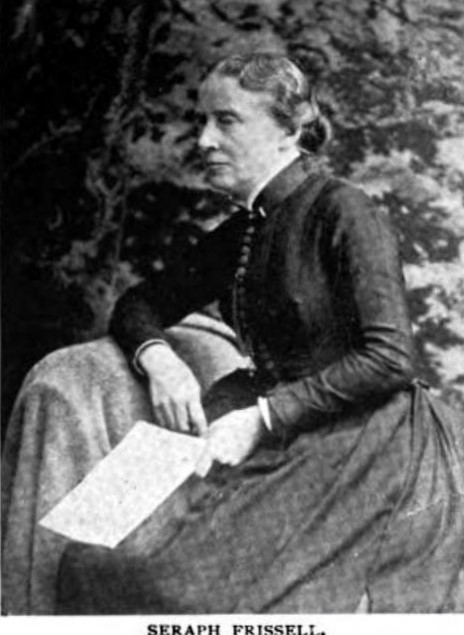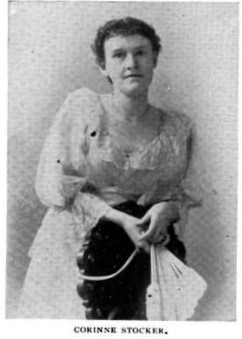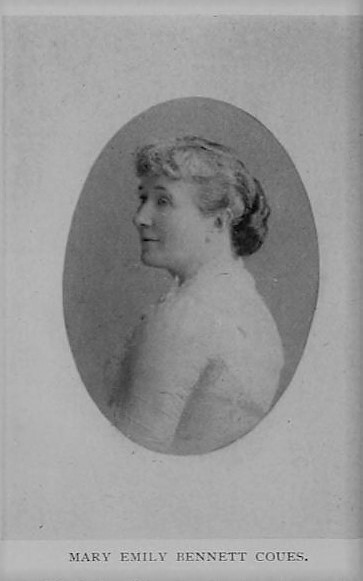August 20 - August 26
Women of the Week
Seraph Frissell, a physician, Corinne Stocker, an elocutionist and journalist, and Mary Emily Bennett Coues, a woman suffragist, are this week's Women of the Week.
-
To learn about them by viewing their items, please click on their images.
-
To read their biographical sketches in A Woman of the Century, please click on the highlighted page numbers to the left of their images.
Physician Seraph Frissell was born in Peru, Massachusetts on August 20, 1840. She attended Mount Holyoke Seminary, while also teaching, and graduated in 1869. Seraph continued teaching until 1872, when she began her medical training at the University of Michigan. Seraph interned at the New England Hospital for Women and Children in 1874 and graduated from the University of Michigan the next year.
After attending lectures in New York City and practicing in Boston, Seraph began her Pittsfield, Massachusetts practice in 1876. In 1885, when she moved to Springfield, Massachusetts, Dr. Frissell became the first female member of the Hampden Medical Society and a Fellow of the Massachusetts Medical Society. She doubled her work during the 1890-1891 academic year, serving as a physician and lecturer at her alma mater, Mount Holyoke, while continuing her Springfield practice.
A Congregationalist, Seraph was a member of the South Congregational Church in Pittsfield until she joined the First Church of Christ in Springfield on May 3, 1885. Interested in missionary endeavors, she was involved with the Woman's Board of Missions.
Also a supporter of the temperance cause, Seraph served as President, Treasurer, Secretary, and "superintendent of the department of Heredity and Health" (304) of her area's Woman's Christian Temperance Union.
Dr. Seraph Frissell passed away in 1915.
Elocutionist and journalist Corinne Stocker was born in Orangeburg, South Carolina on August 21, 1871, but she lived most of her life in Atlanta, Georgia. She was an extremely intelligent and talented woman. As her A Woman of the Century profile notes:
"At an early age Corinne showed a decided histrionic talent. In her ninth year she won the Peabody medal for elocution in the Atlanta schools over competitors aged from eight to twenty-five years. In 1889, she was placed in the Cincinnati College of Music, where she made the most brilliant record in the history of the school, completing a four year course in seven months."
After graduation, Corinne conducted parlor readings and taught elocution. She was a very popular teacher, but after a year she decided to forge a journalism career and joined the Atlanta Journal.
In March of 1892, when she was just twenty, Corinne's "Field of Woman's Work" was published in Atlanta Journal and then reprinted in The Herald and News.
She was a member of the Governing Board of the Georgia Women's Press Club, where her colleagues included Leonora Beck and Ellen J. Dortch,
During the time of the Atlanta Exposition in 1895, the Waterbury Democrat of Connecticut noted Corinne as one of the "leading women" journalists in Atlanta. It also noted her female colleagues at the Atlanta Journal, Mary Louise Huntley, Brent Whiteside, and Mary Jackson, as well as Emily Battey and other prominent Georgia women
On June 17, 1896, Corinne married Thaddeus E. Horton, another South Carolina native who had become managing editor of the Atlanta Journal in late 1894, at St. Luke's Church in Atlanta. The couple lived in Atlanta until they moved to New York City in late 1897. The Anderson Intelligencer of October 20, 1897, noted the Atlanta Journal's piece about their move:
"Mr. and Mrs. Thaddeus Horton have scores of friends who will read with mingled emotions of interest, congratulations and regret that they leave soon to make their home in New York. Mrs. Horton has lived in Atlanta all her life and Mr. Horton for the past seven years; and both have warm friends who hate to see them go, and yet who realize that the going means literary advancement. Mr. Horton has accepted a position on the Times, and Mrs. Horton will pursue her literary work at the great center of things with increased advantage."
Unfortunately, their life in New York was not as happy as it was anticipated to be. Thad served as political editor of The New York Times until he died of typhoid fever on November 21, 1899. The next April, Corinne, who had moved back to Atlanta and was living with her mother, gave birth to their daughter, Thaddesia Edgarda.
While raising her infant in 1900, Corinne wrote for the September and October volumes of Ladies' Home Journal. She continued writing throughout the decade, contributing to House Beautiful and Uncle Remus's Magazine.
In 1909, Corinne founded the Atlanta Players' Club and was in charge of a benefit performance at the Grand Opera House. She also directed a performance of an Oscar Wilde play. Corine continued her writing as well, contributing "Old South in American Architecture" to the Uncle Remus's Magazine for October, 1909.
During Theodore Roosevelt’s 1912 Presidential Campaign, Corinne was chair of the “Georgia Moosettes” for Atlanta’s Fifth Congressional District. She and numerous other Georgian women supported Roosevelt’s Progressive platform because they saw it as a positive force for women.
Corinne was married to Chauncey Smith by 1920, a marriage that lasted until his death in the early 1930s. She lived in Atlanta with her daughter for many years, then she moved to Baldwin in the 1940s. Corinne passed away in Fulton, Georgia on September 11, 1947 and was buried in Atlanta's Crest Lawn Cemetery.
Mary Emily Bennett Coues was born in New York, New York on August 26, 1835.
After traveling to and living abroad, Mary Emily married Philadelphia merchant Joseph W. Bates. In addition to their Philadelphia mansion at 1814 Chestnut Street, the couple lived in Yorkshire, England. Joseph passed away in 1886.
The next year, Mary Emily married Dr. Elliott Coues, a scientist and writer, in a ceremony performed by Edward Everett Hale. Mary Emily and Elliott lived at 1726 N Street NW in Washington, D.C.
Mary Emily and Clara Barton were two of the founding members of the Pro Re Nata women's club in Washington, D.C. in 1892. She was one of Pro Re Nata's representatives to the Washington Liberty Bell Association in 1893, where she worked to promote a performance of "As You Like It" for people in Washington.
In addition, Mary Emily and Elliott were involved with the World Psychical Science Congress in Chicago in 1893, Mary Emily was a member of the Woman's Psychical Congress Committee, along with Frances Elizabeth Willard, Myra Bradwell, and several other women.
The Washington Times supported Mary Emily's 1894 bill "To prohibit expectoration in public places," noting that it "deserves from the general public as serious consideration as it has been given by the Pro Re Nata Club. It has both aesthetic and sanitary claims."
In 1895, she became a member of the Floyd Memorial Association, a group of people who strove to erect a memorial to the noted explorer of the West.
Mary Emily, who was widowed on Christmas Day in 1899, was living at her Washington, D.C. home at the turn of the century. In mid-February of 1904 and 1905, she attended receptions at the White House given by President and Mrs. Roosevelt. Mary Emily passed away in 1906.



